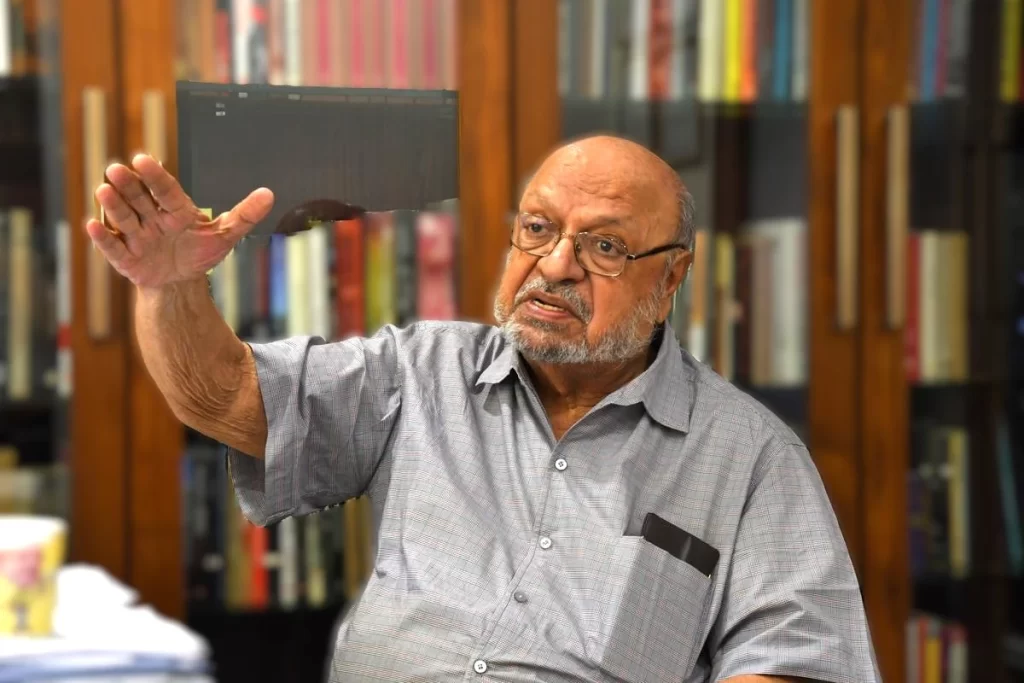Veteran filmmaker Shyam Benegal, a towering figure in Indian cinema and a key proponent of the Parallel Cinema movement, passed away in Mumbai on December 23, 2024. He was 90 years old. Known for his thought-provoking and deeply impactful films such as Ankur, Nishant, Manthan, and Zubeidaa, Benegal’s work critically examined the many social fault lines within Indian society, shedding light on issues like feudalism, caste, and women’s emancipation. His death was attributed to complications arising from chronic kidney disease, a condition he had battled for several years.
Benegal’s legacy in Indian cinema is monumental. He was not only a filmmaker but also a visionary who played a crucial role in shaping the narrative of post-Independence India through his art. His films broke away from mainstream Bollywood conventions, exploring complex themes and experimenting with narrative forms. His dedication to telling stories that reflected the reality of India’s socio-political landscape made his work resonate deeply with audiences and critics alike.
The filmmaker’s passing was confirmed by his daughter, Pia Benegal, who shared the news with PTI. “He passed away at 6:38 p.m. at Wockhardt Hospital Mumbai Central. He had been suffering from chronic kidney disease, which had worsened in recent years,” she stated.
Benegal’s contribution to Indian cinema goes far beyond his role as a director. He was instrumental in fostering talent, and his work introduced a new generation of actors to the limelight. His films featured stellar performances from the likes of Naseeruddin Shah, Smita Patil, Shabana Azmi, and Amrish Puri, many of whom became regulars in his films. Shah, who credited Benegal for providing him an early break in Ankur, expressed his deep admiration and gratitude. “It is impossible to describe in a few words what Shyam meant to me,” Shah said in a message. “He was the one who believed in me when no one else did. He and Nira (his wife) were a huge support in my difficult days.”
Born in 1934 in Hyderabad, Shyam Benegal had a unique connection to Indian cinema’s history. His paternal grandmother was related to renowned filmmaker Guru Dutt, making him a distant relative. Before venturing into filmmaking, Benegal worked in advertising and taught at the Film and Television Institute of India (FTII). His first feature, Ankur (1974), explored the themes of class and caste, introducing audiences to Shabana Azmi in a memorable debut. This film marked the beginning of a distinguished career that would produce films addressing issues that defined India’s social fabric.
Throughout his career, Benegal collaborated with some of the finest talent in the industry. His longstanding partnership with cinematographer Govind Nihalani and music composer Vanraj Bhatia helped craft his distinct cinematic style. He also worked with many iconic actors, including Shashi Kapoor, who starred in two of Benegal’s films, Junoon (1978) and Kalyug (1981), both of which are now regarded as classics in Indian cinema.
Despite his success, Benegal remained grounded and continued to create films that were both artistic and commercially viable. His work crossed the boundaries of traditional filmmaking, earning him critical acclaim in both national and international circles. Benegal’s ability to infuse humor into serious themes was evident in films such as Charandas Chor, a delightful black-and-white film he made for the Children’s Film Society of India.
Benegal’s late-career work included biographical films and satires that reflected his evolving perspective on Indian society. His filmography from the 2000s and beyond includes films such as Netaji Subhas Chandra Bose: The Forgotten Hero, Welcome to Sajjanpur, and Well Done Abba, which further showcased his versatility and keen understanding of India’s complex social and political dynamics. In 2023, he made a return to filmmaking after a hiatus with Mujib: The Making of a Nation, a biopic about Bangladesh’s founding leader, Sheikh Mujibur Rahman.
Benegal’s impact on Indian cinema was acknowledged through numerous accolades, including 18 national awards and the prestigious Padma Shri and Padma Bhushan awards. He was also honored with the Dadasaheb Phalke Award, the highest recognition in Indian cinema. His work continues to inspire filmmakers and cinephiles alike, and his passing marks the end of an era in Indian cinema.
Earlier this year, Benegal’s 1976 masterpiece Manthan was honored with a 4K restoration, which was showcased at the Cannes Film Festival. The film, which addressed the dairy cooperative revolution in Gujarat, remains a testament to Benegal’s innovative spirit and commitment to using cinema as a tool for social change.
Shyam Benegal’s death leaves a void in the world of cinema, but his influence will continue to guide and inspire future generations of filmmakers. His work remains a powerful reminder of the transformative potential of cinema in shaping society.






